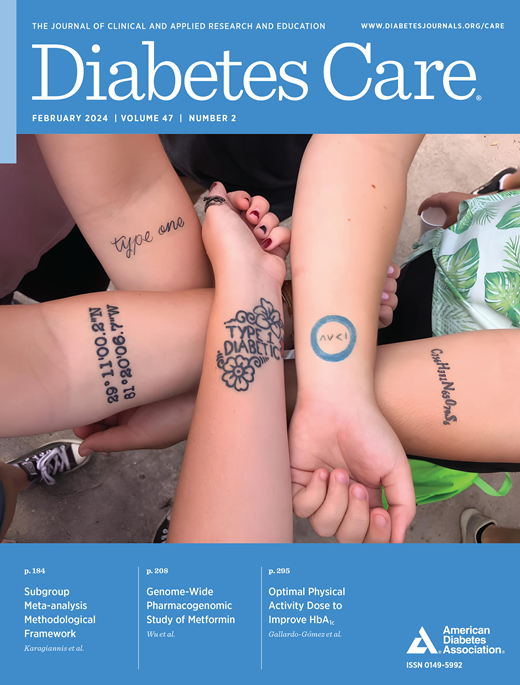Continuous Glucose Monitoring Profiles in Pregnancies With and Without Gestational Diabetes Mellitus
IF 14.8
1区 医学
Q1 ENDOCRINOLOGY & METABOLISM
引用次数: 0
Abstract
OBJECTIVE To determine whether continuous glucose monitoring (CGM)-derived glycemic patterns can characterize pregnancies with gestational diabetes mellitus (GDM) as diagnosed by standard oral glucose tolerance test at 24–28 weeks’ gestation compared with those without GDM. RESEARCH DESIGN AND METHODS The analysis includes 768 individuals enrolled from two sites prior to 17 weeks’ gestation between June 2020 and December 2021 in a prospective observational study. Participants wore blinded Dexcom G6 CGMs throughout gestation. Main outcome of interest was a diagnosis of GDM by oral glucose tolerance test (OGTT). Glycemic levels in participants with GDM versus without GDM were characterized using CGM-measured glycemic metrics. RESULTS Participants with GDM (n = 58 [8%]) had higher mean glucose (109 ± 13 vs. 100 ± 8 mg/dL [6.0 ± 0.7 vs. 5.6 ± 0.4 mmol/L], P < 0.001), greater glucose SD (23 ± 4 vs. 19 ± 3 mg/dL [1.3 ± 0.2 vs. 1.1 ± 0.2 mmol/L], P < 0.001), less time in range 63–120 mg/dL (3.5–6.7 mmol/L) (70% ± 17% vs. 84% ± 8%, P < 0.001), greater percent time >120 mg/dL (>6.7 mmol/L) (median 23% vs. 12%, P < 0.001), and greater percent time >140 mg/dL (>7.8 mmol/L) (median 7.4% vs. 2.7%, P < 0.001) than those without GDM throughout gestation prior to OGTT. Median percent time >120 mg/dL (>6.7 mmol/L) and time >140 mg/dL (>7.8 mmol/L) were higher as early as 13–14 weeks of gestation (32% vs. 14%, P < 0.001, and 5.2% vs. 2.0%, P < 0.001, respectively) and persisted during the entire study period prior to OGTT. CONCLUSIONS Prior to OGTT at 24–34 weeks’ gestation, pregnant individuals who develop GDM have higher CGM-measured glucose levels and more hyperglycemia compared with those who do not develop GDM.妊娠糖尿病和非妊娠糖尿病孕妇的连续血糖监测图谱
目的 确定连续血糖监测(CGM)得出的血糖模式是否能描述妊娠 24-28 周时通过标准口服葡萄糖耐量试验诊断出的妊娠糖尿病(GDM)孕妇与非 GDM 孕妇的血糖模式。研究设计和方法 该分析包括在 2020 年 6 月至 2021 年 12 月期间,在两个地点对妊娠 17 周前的 768 名妊娠者进行的前瞻性观察研究。参与者在整个妊娠期间佩戴盲法 Dexcom G6 CGM。主要研究结果是通过口服葡萄糖耐量试验(OGTT)诊断出 GDM。使用 CGM 测量的血糖指标对 GDM 患者和非 GDM 患者的血糖水平进行分析。结果 患有 GDM 的参与者(n = 58 [8%])平均血糖更高(109 ± 13 vs. 100 ± 8 mg/dL [6.0 ± 0.7 vs. 5.6 ± 0.4 mmol/L],P < 0.001),血糖 SD 更大(23 ± 4 vs. 19 ± 3 mg/dL [1.3 ± 0.2 vs. 1.1 ± 0.2 mmol/L],P < 0.001),在 63-120 mg/dL (3.5-6.7毫摩尔/升)的时间较少(70% ± 17% vs. 84% ± 8%,P < 0.001),在>120毫克/分升(>6.7毫摩尔/升)范围内的时间百分比较高(中位数23% vs. 12%,P < 0.001),以及在 OGTT 之前的整个妊娠期间,与无 GDM 者相比,更长的时间 >140 mg/dL (>7.8 mmol/L)(中位数为 7.4% vs. 2.7%,P < 0.001)。中位时间>120 mg/dL(>6.7 mmol/L)和时间>140 mg/dL(>7.8 mmol/L)的百分比早在妊娠 13-14 周时就较高(分别为 32% vs. 14%,P< 0.001 和 5.2% vs. 2.0%,P< 0.001),并在 OGTT 前的整个研究期间持续存在。结论 在妊娠 24-34 周进行 OGTT 之前,与未发生 GDM 的孕妇相比,发生 GDM 的孕妇的 CGM 测量血糖水平更高,高血糖现象更严重。
本文章由计算机程序翻译,如有差异,请以英文原文为准。
求助全文
约1分钟内获得全文
求助全文
来源期刊

Diabetes Care
医学-内分泌学与代谢
CiteScore
27.80
自引率
4.90%
发文量
449
审稿时长
1 months
期刊介绍:
The journal's overarching mission can be captured by the simple word "Care," reflecting its commitment to enhancing patient well-being. Diabetes Care aims to support better patient care by addressing the comprehensive needs of healthcare professionals dedicated to managing diabetes.
Diabetes Care serves as a valuable resource for healthcare practitioners, aiming to advance knowledge, foster research, and improve diabetes management. The journal publishes original research across various categories, including Clinical Care, Education, Nutrition, Psychosocial Research, Epidemiology, Health Services Research, Emerging Treatments and Technologies, Pathophysiology, Complications, and Cardiovascular and Metabolic Risk. Additionally, Diabetes Care features ADA statements, consensus reports, review articles, letters to the editor, and health/medical news, appealing to a diverse audience of physicians, researchers, psychologists, educators, and other healthcare professionals.
 求助内容:
求助内容: 应助结果提醒方式:
应助结果提醒方式:


